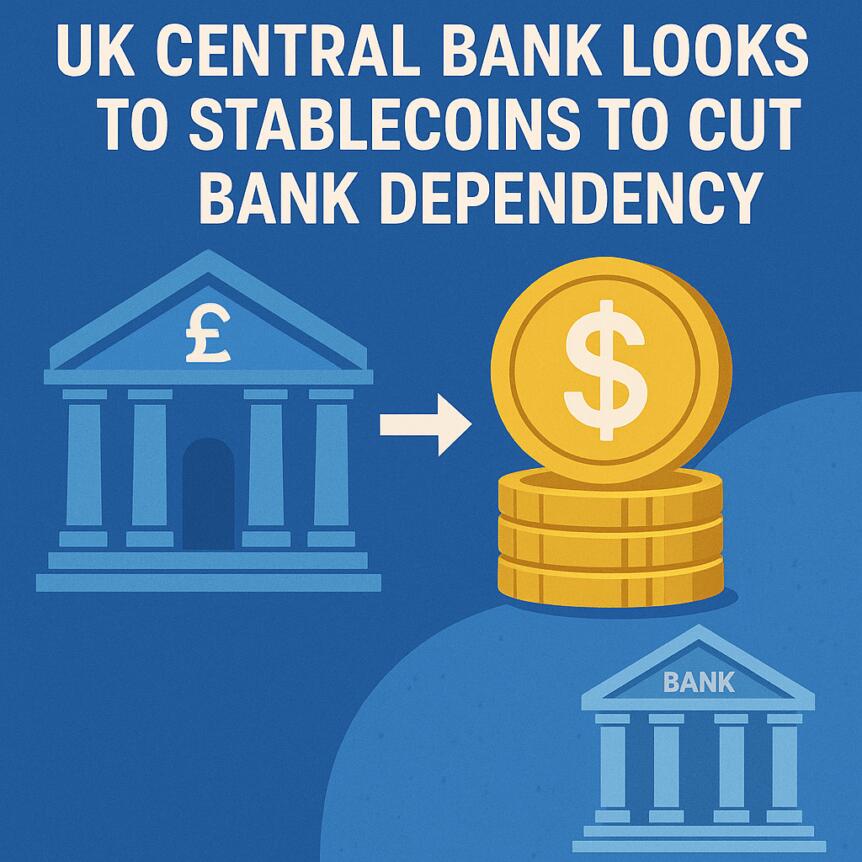UK Central Bank Looks to Stablecoins to Cut Bank Dependency

The Bank of England is signaling a nuanced stance on digital assets, with recent remarks suggesting that stablecoins could play a role in transforming the UK’s financial landscape. Central bank Governor Andrew Bailey indicated that integrating stablecoins into the economy might reduce dependence on traditional banking and foster more innovative payment systems. This development marks a notable shift in the central bank’s approach to emerging cryptocurrency technologies, highlighting both opportunities and regulatory considerations in the evolving crypto markets.
- Bank of England Governor suggests stablecoins could reduce reliance on traditional banks in the UK.
- Bailey discusses potential for separating money from credit creation within the current financial system.
- The BoE plans to publish a consultation on a new systemic stablecoin regime for the UK.
- Industry groups oppose proposed caps on stablecoin holdings, citing concerns over innovation.
- Bailey emphasizes stablecoins’ role in future payments, with necessary safeguards and regulation.
Reevaluating the Role of Stablecoins in UK Finance
In a recent editorial in the Financial Times, Andrew Bailey highlighted that the existing financial system heavily relies on fractional reserve banking, where commercial banks hold a fraction of deposits and lend the rest, thereby creating new money through credit. He pointed out that most assets backing bank money are not risk-free, being tied to loans secured from individuals and companies. Bailey proposed that it might be possible to, at least partially, detach money from credit creation, allowing stablecoins to coexist with traditional currency while non-bank entities assume a larger role in credit provision.
“Most of the assets backing commercial bank money are not risk-free: they are loans to individuals and to companies,” Bailey explained. “The system does not have to be organised like this.””
While cautioning that thorough analysis is necessary, Bailey indicated openness to a future where stablecoins could reinforce the UK’s payment infrastructure, provided they meet certain standards and safeguards.
Bank of England headquarters. Source: WikimediaRelated: UK Finance pilots tokenized sterling deposits with six major banks
Industry Concerns Over Stablecoin Limits
Bailey’s stance has faced criticism from UK-based crypto advocacy groups, which oppose the Bank of England’s proposal to impose caps on individual stablecoin holdings. Industry leaders argue that such restrictions could hinder innovation and place the UK at a disadvantage compared to other jurisdictions where no such limits exist.
Tom Duff Gordon, Coinbase’s vice-president of international policy, emphasized, “No other major jurisdiction has deemed it necessary to impose caps.” The debate continues as stakeholders assess the impact of regulatory measures on the burgeoning stablecoin ecosystem.
Bailey’s comments, however, hint at a possible shift in perspective. He clarified that his primary focus remains on enabling stablecoins for payments and settlement purposes rather than restricting their growth, provided they meet robust standards.
Related: UK to deepen collaboration with the US on crypto regulation
Proposed Central Bank Accounts for Stablecoins
Bailey announced that the Bank of England intends to publish a consultation paper in the coming months outlining a new framework for systemic stablecoins. This regime would apply to tokens used for standard payments or settling transactions within core financial markets.
Significantly, Bailey suggested that “widely used UK stablecoins should have access to accounts at the [Bank of England], reinforcing their status as money.” Such a measure would support the integration of stablecoins into official financial infrastructure, helping the UK capitalize on the potential of blockchain and crypto innovations while safeguarding financial stability.
This move is seen as a strategic step towards tokenizing deposits—an idea Bailey previously warned about—where stablecoins could serve as a bridge to modernize the banking system and enhance transparency.
Stablecoins: A Path Toward Innovation with Caution
Despite his openness to the potential of stablecoins, Bailey emphasized the need for stringent oversight. He pointed out that features like insurance against operational risks and standardized terms are crucial for maintaining trust and security in crypto-powered payment systems.
“It should also be possible to have innovation in the form of money,” Bailey said, “and it would be wrong to be against stablecoins.” He recognizes their capacity to drive advances in payment networks but stresses that stablecoins and related blockchain assets must prioritize safety and risk mitigation.
As the UK explores regulatory pathways for cryptocurrencies and stablecoins, Bailey’s remarks underscore a balanced approach—encouraging innovation while emphasizing the importance of robust safeguards to ensure financial stability amidst the evolving crypto markets.
This article was originally published as UK Central Bank Looks to Stablecoins to Cut Bank Dependency on Crypto Breaking News – your trusted source for crypto news, Bitcoin news, and blockchain updates.
คุณอาจชอบเช่นกัน

Who is David Schwartz, the XRP mastermind who stepped down as CTO after 13 years

BONK Price Rally Ahead? Open Interest Jumps as TD Buy Signal Flashes
